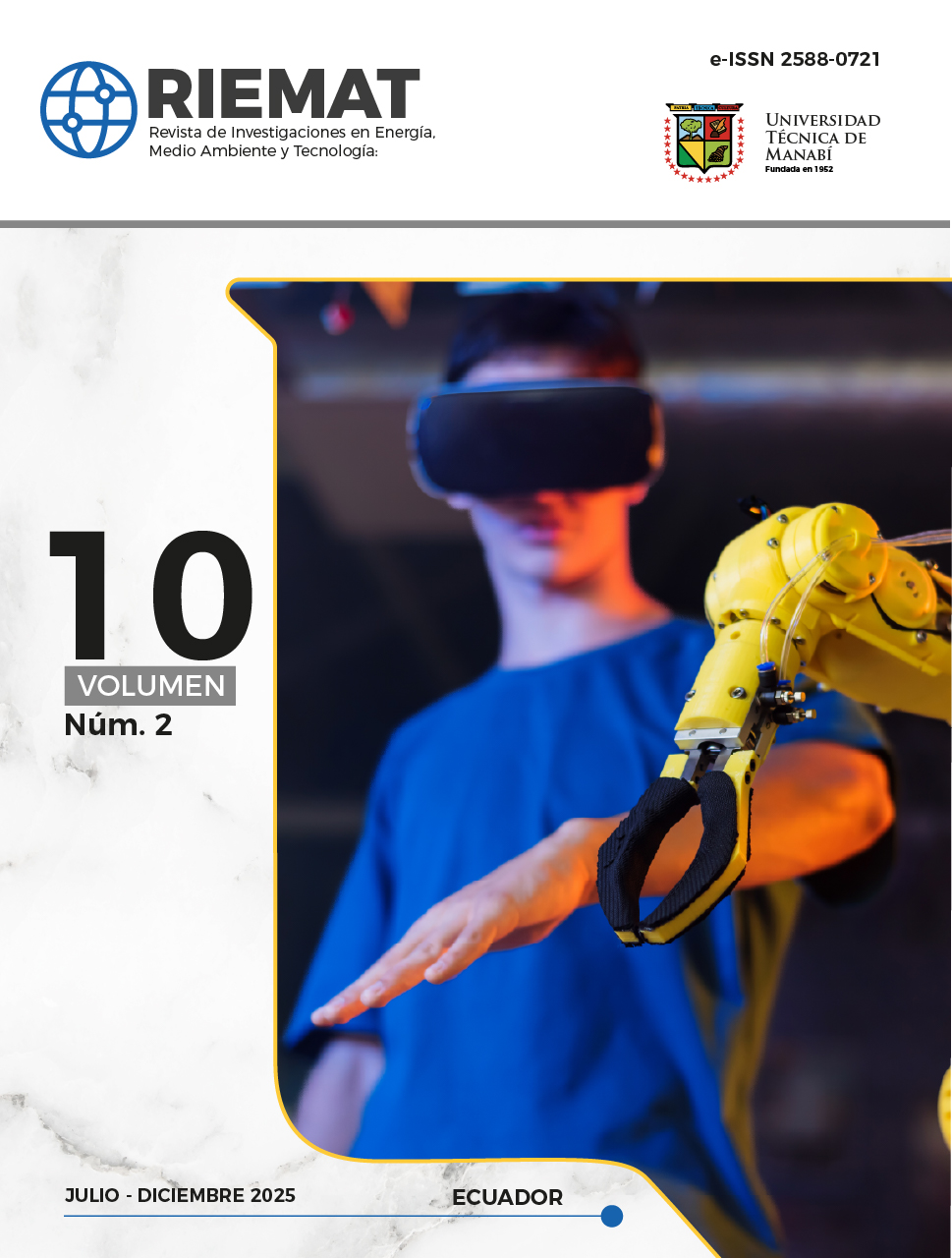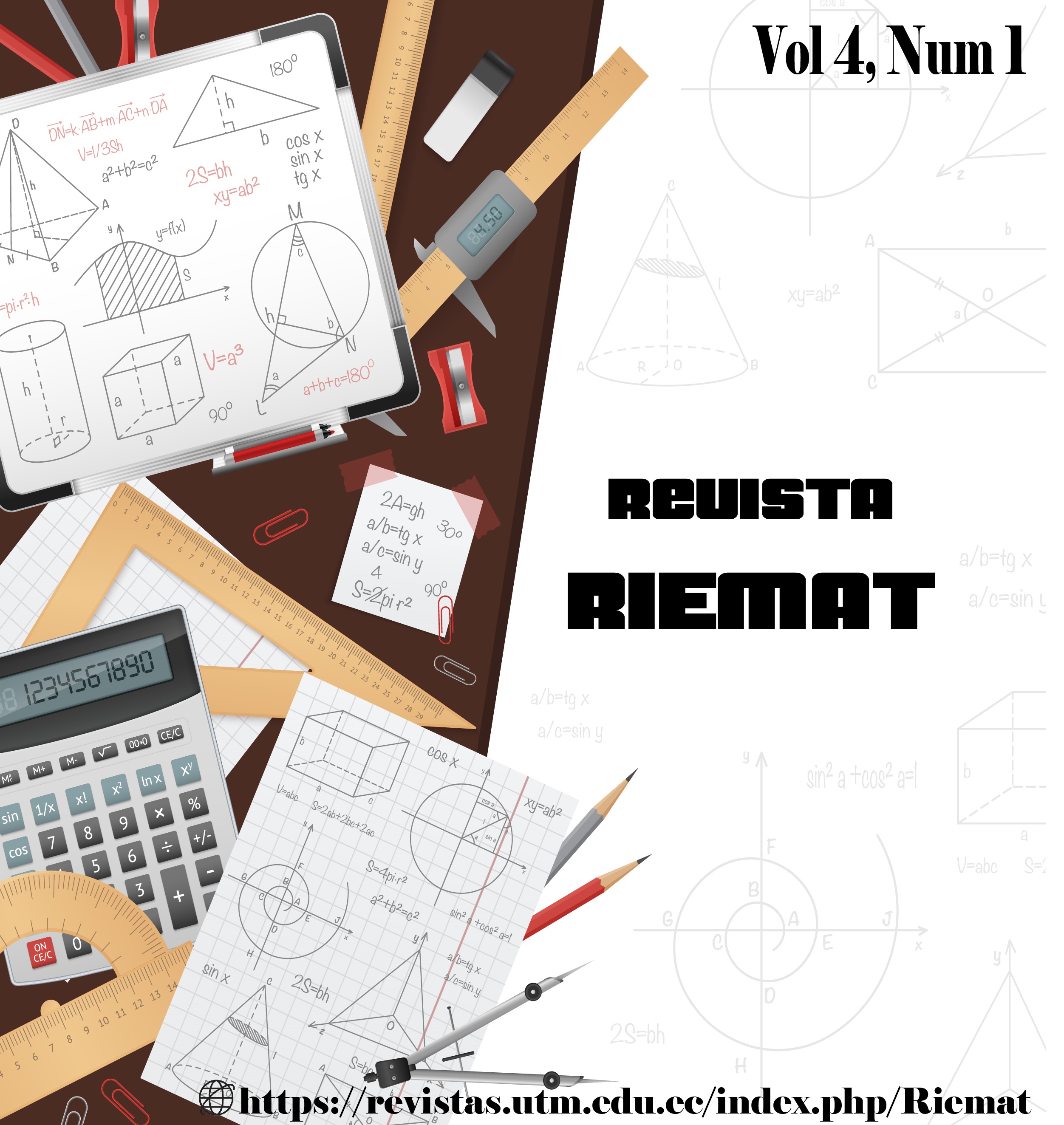Archives
-

January - June
Vol. 11 No. 1 (2026)Cover description: A biomaterial such as guadua cane proves that innovation can also be completely natural. Its strength, lightness, and renewable origin make it ideal for creating modern, efficient, and environmentally friendly buildings, reinforcing the global commitment to green technology.
-

July - December
Vol. 10 No. 2 (2025)Cover Description: Artificial intelligence (AI) has become an essential tool for driving development in various fields, from health and education to industry and environmental protection. Thanks to its ability to analyze large volumes of data and optimize processes, AI makes it possible to improve strategic decisions and design more efficient and personalized solutions.
-

January - June
Vol. 10 No. 1 (2025)Cover Description: Artificial intelligence (AI) has become an essential tool for driving development in various fields, from health and education to industry and environmental protection. Thanks to its ability to analyze large volumes of data and optimize processes, AI makes it possible to improve strategic decisions and design more efficient and personalized solutions.
-

July - December
Vol. 9 No. 2 (2024)Cover description: Sustainable buildings are key to reducing environmental impact and promoting responsible urban development. Using eco-friendly materials and efficient technologies to minimize energy consumption should become a criterion to be considered in any current construction. Its importance lies in preserving resources and mitigating climate change.
-

January - June
Vol. 9 No. 1 (2024)Cover description: Sustainable buildings are key to reducing environmental impact and promoting responsible urban development. Using eco-friendly materials and efficient technologies to minimize energy consumption should become a criterion to be considered in any current construction. Its importance lies in preserving resources and mitigating climate change.
-

July - December
Vol. 8 No. 2 (2023)Cover description: Renewable energy and storage: the future of energy sustainability. Renewable energy storage is a fundamental pillar of energy sustainability. This technology makes it possible to capture and conserve energy generated by renewable sources, such as solar and wind, for use when generation is insufficient or unavailable. This innovation not only improves the reliability and resilience of the electric grid, but also facilitates the integration of renewable energies into the global energy matrix. The combination of these sources with storage systems is key in the transition to a sustainable energy model.
-

January - June
Vol. 8 No. 1 (2023)Cover description: Renewable energy and storage: the future of energy sustainability. Renewable energy storage is a fundamental pillar of energy sustainability. This technology makes it possible to capture and conserve energy generated by renewable sources, such as solar and wind, for use when generation is insufficient or unavailable. This innovation not only improves the reliability and resilience of the electric grid, but also facilitates the integration of renewable energies into the global energy matrix. The combination of these sources with storage systems is key in the transition to a sustainable energy model.
-

July - December
Vol. 7 No. 2 (2022)Cover description: Innovation and Applied Technology in Engineering Sciences. Innovation and applied technology in engineering are essential pillars for the advancement and optimization of systems, processes, and products in sectors such as construction, manufacturing, energy, and information technology. This approach develops and applies emerging technologies and advanced methodologies to solve complex problems, improve operational efficiency and promote sustainability. Engineering innovation refines existing technologies and generates disruptive solutions that integrate scientific and technical principles to meet the challenges of an evolving society.
-

January - June
Vol. 7 No. 1 (2022)Cover description: Innovation and Applied Technology in Engineering Sciences. Innovation and applied technology in engineering are essential pillars for the advancement and optimization of systems, processes, and products in sectors such as construction, manufacturing, energy, and information technology. This approach develops and applies emerging technologies and advanced methodologies to solve complex problems, improve operational efficiency and promote sustainability. Engineering innovation refines existing technologies and generates disruptive solutions that integrate scientific and technical principles to meet the challenges of an evolving society.
-

July - December
Vol. 6 No. 2 (2021)Descripción de portada: Innovación y Sostenibilidad en Ingeniería y Gestión de Infraestructuras. Este volumen de RIEMAT presenta investigaciones enfocadas en la modernización y optimización de sistemas en ingeniería y gestión de infraestructuras. Desde control automatizado en maquinarias industriales hasta evaluaciones de riesgo en zonas urbanas, los artículos abordan desafíos clave para el desarrollo sostenible y la eficiencia operativa. Se incluyen estudios sobre el control de temperatura en procesos industriales, el diseño de soluciones para el sector salud y el análisis de intersecciones urbanas para mejorar el flujo vehicular, así como una visión estratégica de sostenibilidad en la construcción en Ecuador.
-

January - June
Vol. 6 No. 1 (2021)Cover description: Innovation and Applied Technology in Engineering Sciences. Innovation and applied technology in engineering are essential pillars for the advancement and optimization of systems, processes, and products in sectors such as construction, manufacturing, energy, and information technology. This approach develops and applies emerging technologies and advanced methodologies to solve complex problems, improve operational efficiency and promote sustainability. Engineering innovation refines existing technologies and generates disruptive solutions that integrate scientific and technical principles to meet the challenges of an evolving society.
-

July - December
Vol. 5 No. 2 (2020)Cover description: Innovation and Sustainability in Engineering, Energy and Urban Mobility. This volume compiles research that reflects the scientific and academic commitment to sustainable development in key areas of applied engineering, such as energy, infrastructure, and process optimization. With a focus on practical application and theoretical analysis, the studies highlight innovative and methodologically rigorous solutions to local and global issues, promoting the efficient use of resources and sustainable solutions in the Latin American context. This volume is presented as a valuable source of knowledge for researchers, academics and professionals, strengthening the advancement of science and the exchange of knowledge in engineering and applied sciences.
-

January - June
Vol. 5 No. 1 (2020)Cover description: Innovation and Sustainability in Engineering, Energy and Urban Mobility. This volume compiles research that reflects the scientific and academic commitment to sustainable development in key areas of applied engineering, such as energy, infrastructure, and process optimization. With a focus on practical application and theoretical analysis, the studies highlight innovative and methodologically rigorous solutions to local and global issues, promoting the efficient use of resources and sustainable solutions in the Latin American context. This volume is presented as a valuable source of knowledge for researchers, academics and professionals, strengthening the advancement of science and the exchange of knowledge in engineering and applied sciences.
-

July - December
Vol. 4 No. 2 (2019)Cover description: Volume 4 of the RIEMAT journal presents research that addresses key technical and environmental issues for sustainable development in Ecuador. This volume includes theoretical and experimental studies on strength of materials, renewable energy efficiency, structural and geotechnical analysis, agro-industrial waste utilization, electricity demand projection, and pollutant monitoring. With a rigorous approach, the articles contribute to the advancement of civil engineering, bioenergy, environmental control and technical education, employing advanced technologies such as simulation and automated control systems, and promoting sustainable and innovative solutions to current challenges.
-

January - June
Vol. 4 No. 1 (2019)Cover description: Volume 4 of the RIEMAT journal presents research that addresses key technical and environmental issues for sustainable development in Ecuador. This volume includes theoretical and experimental studies on strength of materials, renewable energy efficiency, structural and geotechnical analysis, agro-industrial waste utilization, electricity demand projection, and pollutant monitoring. With a rigorous approach, the articles contribute to the advancement of civil engineering, bioenergy, environmental control and technical education, employing advanced technologies such as simulation and automated control systems, and promoting sustainable and innovative solutions to current challenges.
-

July - December
Vol. 3 No. 2 (2018)Cover description: This issue of RIEMAT examines energy efficiency and the impact of innovation in the Ecuadorian electricity sector, with studies on the Electrification Master Plan and the cost structure of distributed generation and smart grids. The articles address key issues such as signage and street lighting for community safety, the use of solar technology in rural areas, and energy saving strategies in university buildings. With a rigorous approach, solutions are proposed to optimize consumption and reduce environmental impact, reflecting RIEMAT's commitment to applied research and the development of sustainable technologies to address energy challenges in Ecuador and the region.
-

January - June
Vol. 3 No. 1 (2018)Cover description: This issue of RIEMAT examines energy efficiency and the impact of innovation in the Ecuadorian electricity sector, with studies on the Electrification Master Plan and the cost structure of distributed generation and smart grids. The articles address key issues such as signage and street lighting for community safety, the use of solar technology in rural areas, and energy saving strategies in university buildings. With a rigorous approach, solutions are proposed to optimize consumption and reduce environmental impact, reflecting RIEMAT's commitment to applied research and the development of sustainable technologies to address energy challenges in Ecuador and the region.
-

July - December
Vol. 2 No. 2 (2017)Cover description: This RIEMAT volume presents key research on sustainable development, energy efficiency, and advanced technologies in Ecuador. It includes rainfall and evaporation analysis for irrigation in the Chone project, characterization of automotive torque converters, and studies on distributed solar generation in Manabí. He also deals with the optimization of electrical networks using neural networks and the use of multi-agent theory in the management of inmotics at the Technical University of Manabí. With research on emissions in Otto engines and energy evaluation at UTM, this edition underscores the commitment to reduce environmental impact and improve efficiency, being a crucial reference for those seeking sustainability and innovation.
-

January - June
Vol. 2 No. 1 (2017)Cover description: This RIEMAT volume presents key research on sustainable development, energy efficiency, and advanced technologies in Ecuador. It includes rainfall and evaporation analysis for irrigation in the Chone project, characterization of automotive torque converters, and studies on distributed solar generation in Manabí. He also deals with the optimization of electrical networks using neural networks and the use of multi-agent theory in the management of inmotics at the Technical University of Manabí. With research on emissions in Otto engines and energy evaluation at UTM, this edition underscores the commitment to reduce environmental impact and improve efficiency, being a crucial reference for those seeking sustainability and innovation.
-

July - December
Vol. 1 No. 2 (2016)Cover description: Volume 1 of the second period of RIEMAT brings together research focused on project planning, water quality, bioclimatic architecture, and sustainable development in Ecuador. This issue includes studies on the work breakdown structure as a planning tool, water quality analysis at the Poza Honda dam, and sustainable architecture guidelines for Portoviejo. It also presents research on the feasibility of extending electrical grids in rural areas, improvements in industrial engineering training, the role of education in the face of the environmental crisis, and the selection of cogeneration schemes in industry. This volume offers significant contributions to innovation and sustainability in engineering and technology.
-

January - June
Vol. 1 No. 1 (2016)Cover description: This issue of RIEMAT presents research that addresses key challenges in engineering, technology and sustainability. Topics include post-earthquake structural analysis and reinforcement, the durability of the Los Caras bridge in contact with estuarine water, the improvement of streets in Portoviejo with paving technologies, and advanced methods for postgraduate quality management. In addition, smart grids for energy efficiency and tools for predicting failures in electrical systems are explored. This volume offers a comprehensive view of technological and methodological solutions that respond to the current challenges of sustainability, infrastructure and productivity, promoting innovation for the benefit of Ecuadorian society.
-
GUIDELINES
2016






















